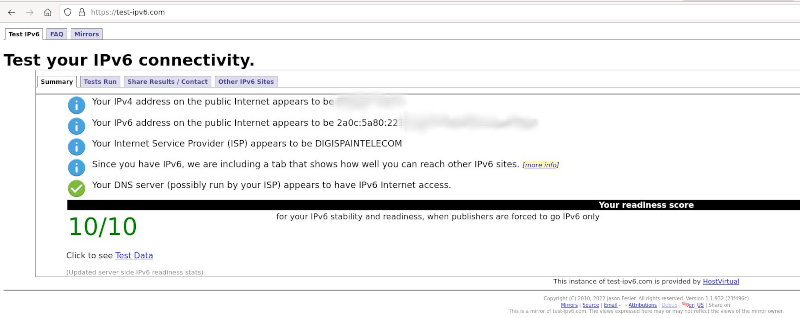Home network refresh: 10G and IPv6

A few days ago, my home network got a refresh that resulted in the enablement of some next-generation technologies for me and my family. Well, next-generation or current-generation, depending on your point of view. Per the ISP standards in Spain (my country), what I’ll describe next is literally the most and latest you can get.
The post title spoiled it already. I have now 10G internet uplink and native IPv6 since I changed my ISP to https://digimobil.es.
My story began a few months ago when a series of fiber deployments started in my neighborhood by a back-then mostly unknown ISP (digimobil). The workers were deploying the fiber inside the street sewers, and I noticed that they were surrounded by advertisements promoting the fastest FTTH deployment in Spain. Indeed, their website was promoting 1G and 10G fiber, so a few days later I asked the workers when would that be available for subscription. They told me to wait just a couple of months, and the wait ended this week.
I called the ISP, and a marketing person told me a lot of unnecessary information about how good service I was purchasing. I asked about IPv6 availability, but that person had no idea. They called me the next day to confirm that the home router they were installing would support both IPv6 and Wi-Fi 6. I was suspicious about nobody in the marketing department knowing anything about any of the two technologies, but I decided to proceed anyway. Just 24 hours after calling them, a technician came to my house and 45 minutes later the setup was ready.
The new home router was a ZTE ZXHN F8648P unit. By the way, it had Linux inside, but I got no GPL copyright notice or anything. It had 1x10G and 4x1G
ethernet LAN ports. The optical speed tests that the technician did were giving between 8 Gbps to 9 Gbps in uplink speed, which seemed fair enough.
Upon quick search, there is apparently a community of folks online which already know how to get the most out of this router by unbloking the root
account (sorry, in spanish only) and using other tools.
When I plugged the RJ45 in my laptop, the magic happened: the interface got a native, public IPv6 from the router. I ran to run the now-classic IPv6 browser test at https://test-ipv6.com/. And here is the result:

If you are curious, this was the IPv6 prefix whois information:
route6: 2a0c:5a80::/29
descr: Digi Spain Telecom S.L.U.
origin: AS57269
They were handing my router a prefix like 2a0c:5a80:2218:4a00::/56. I ignored if the prefix was somehow static, dynamic, just for me, or
anything else. I’ve been waiting for native IPv6 at home for years. In the past, I’ve had many ideas and projects to host
network services at home leveraging IPv6. But when I finally got it, I didn’t know what to do next. I had a 7 months old
baby, and honestly I didn’t have the spare time to play a lot with the setup.
Actually, I had no need or use for such fast network either. But my coworker Andrew convinced me: given the price € 30 EUR / month, I didn’t have any reason not to buy it.
In fact, I didn’t have any 10G-enabled NIC at home. I had a few laptops with 2.5G ports, though, and that was enough to experience the new network speeds. Since this write-up was inspired by the now almost-legenday post by Michael Stapelberg My upgrade to 25 Gbit/s Fiber To The Home, I contacted him, and he suggested running a few speed tests using the Ookla suite against his own server. Here are the results:
$ docker run --net host --rm -it docker.io/stapelberg/speedtest:latest -s 50092
[..]
Server: Michael Stapelberg - Zurich (id = 50092)
ISP: Digi Spain
Latency: 34.29 ms (0.20 ms jitter)
Download: 2252.42 Mbps (data used: 3.4 GB )
Upload: 2239.27 Mbps (data used: 2.8 GB )
Packet Loss: 0.0%
Result URL: https://www.speedtest.net/result/c/cc8d6a78-c6f8-4f71-b554-a79812e10106
$ docker run --net host --rm -it docker.io/stapelberg/speedtest:latest -s 50092
[..]
Server: Michael Stapelberg - Zurich (id = 50092)
ISP: Digi Spain
Latency: 34.05 ms (0.21 ms jitter)
Download: 2209.85 Mbps (data used: 3.2 GB )
Upload: 2223.45 Mbps (data used: 2.9 GB )
Packet Loss: 0.0%
Result URL: https://www.speedtest.net/result/c/32f9158e-fc1a-47e9-bd33-130e66c25417
This is over IPv6. Very satisfying.
Bonus point: when I called my former ISP to cancel the old subscription the conversation was like:
- I want to cancel the service.
- What’s the reason?
- I got upgraded to 10G by another ISP
- The speed is measured in MB, not G.
- Ok, I got upgraded to 10.000 MB
- That’s not possible.
- Well …
I didn’t even bother mentioning IPv6.
Cheers!
